StudentInnen stürmen das IFFI
Ein Projekt über das Filmemachen am Institut für Romanistik
Home
Viele interessante und faszinierende Persönlichkeiten nahmen am Internationalen Filmfestival in Innsbruck teil. Wir hatten die Ehre, einige davon persönlich kennen zu lernen. Von Produzenten über Regisseure bis hin zu Schauspielern war alles vertreten, mit einigen von ihnen konnten wir sogar Interviews durchführen und so einiges Spannendes erfahren.
Doch genauso unterschiedlich wie unsere Interviewpartner sind auch die jeweiligen Sprachen: auf Französisch, Spanisch, Italienisch, Englisch und auch Deutsch wurden Personen befragt - eine Spielwiese für Sprachbegeisterte!
Daher laden wir Sie nun ein, gemeinsam mit uns eine aufregende Reise durch die kunterbunte Filmwelt anzutreten. Der Langeweile wollen wir dabei keinen Platz bieten. Genießen Sie die verschiedenen Interviews in den unterschiedlichsten Sprachen und lassen Sie sich verzaubern! Viel Spaß beim Lesen!
Hier kommen Sie schnell zum Interview mit:
Álvaro Ogalla (Schauspieler aus Madrid)
Arami Ullón (Produzentin, Regisseurin und Schauspielerin aus Paraguay)
Eduardo del Llano (Regisseur aus Kuba)
Julia Gutweniger und Florian Kofler (Regisseure aus Südtirol)
Manuela Buono (Filmverleiherin aus Italien)
Mohammed Soudani (Regisseur aus Algerien)
Yared Zeleke (Regisseur aus Äthiopien)
Álvaro Ogalla
→ Schauspieler aus Madrid. Film El Apostata
Hier können Sie in Kürze das Interview mit Alvaro Ogalla lesen.
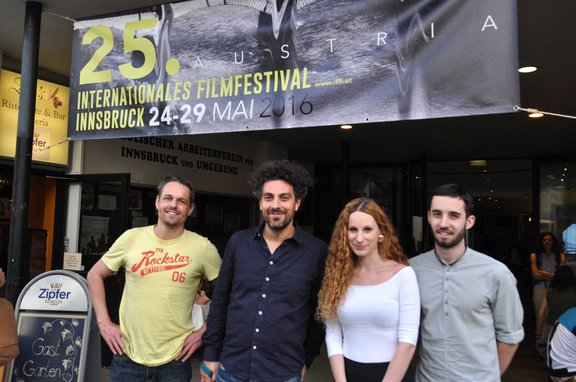
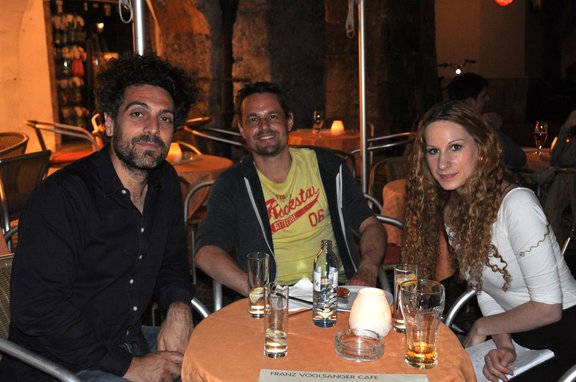
Arami Ullón
→ Produzentin, Regisseurin und Protagonistin. Dokumentarfilm El tiempo nublado
¿Qué haremos con nuestros padres cuando sean viejos y enfermos?
El 28 de mayo de 2016, a las 19:45, nosotras – Victoria Schwarz, Eva Misslinger y Maria Waldner – nos encontramos con la productora, directora y protagonista del documental El tiempo nublado (2014), Arami Ullón después de la presentación de su película en el cine Leokino en Innsbruck durante el IFFI (Internationales Filmfestival Innsbruck). Arami Ullón ha realizado este documental autobiográfico, en el que cuenta la situación de su madre que sufre de epilepsía y Parkinson desde hace muchos años, es de Paraguay y vive ahora en Basilea, Suiza.
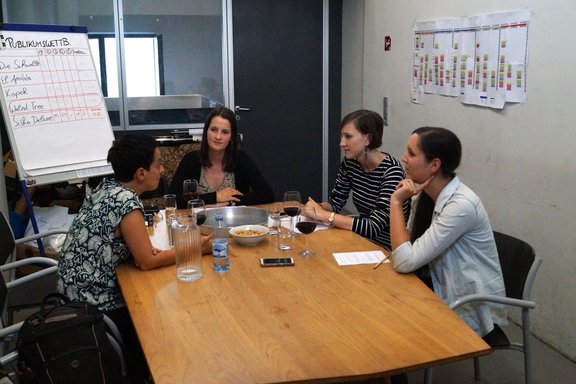
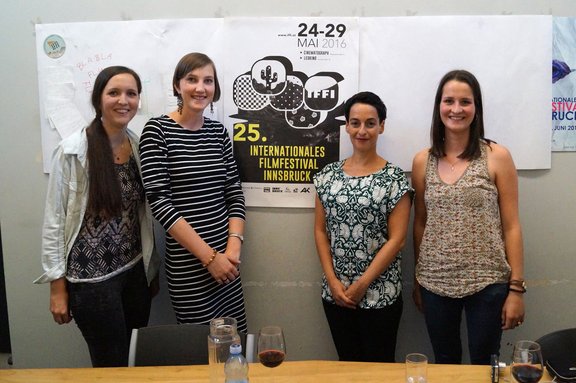
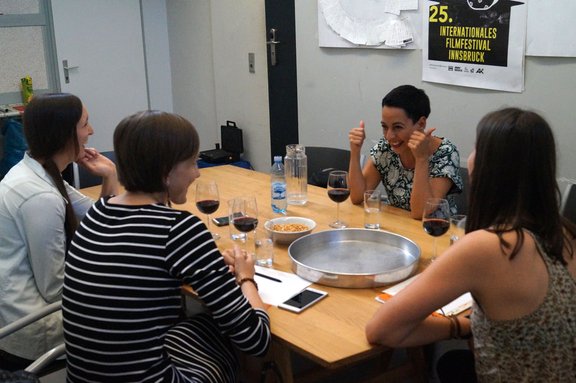
¿Es su primera vez aquí, en Innsbruck?
Sí.
¿Y le gusta?
Me encanta. Por la mañana fui a caminar por la ciudad vieja y me pareció hermoso, pero las montañas son muy imponentes y en algunas ocasiones parecen una pared. En Suiza también me pasa lo mismo, ya que las montañas me dan un poco de miedo. Son muy impresionantes.
¿Ya ha asistido a algunos festivales de cine con su documental El tiempo nublado? ¿Cuál le gustó más? ¿Alguno de ellos fue especial? ¿Cómo le fue?
Sí, este (en Innsbruck) es el festival número 50. Aquí, en Innsbruck, por ejemplo, en las Q&A (preguntas y respuestas) después de la presentación de mi película el chico que lo moderó tenía preguntas muy interesantes, lo que no siempre ocurre, ya que, a veces, las preguntas son más banales. Para mí siempre es un buen ejercicio volver a pensar en la película desde otro punto de vista. Yo nunca volví a ver mi film, por eso es muy interesante encontrarse con las preguntas del espectador.
¿Cuáles son para usted las diferencias más significativas entre Paraguay y Suiza? Ya nos ha contado que en Paraguay la democracia oficial en realidad no es una democracia.
Es difícil para mí hablar sobre las diferencias políticas entre Paraguay y Suiza porque el sistema suizo es tan único y complicado que yo, después de haber vivido cuatro años allí, no lo entiendo muy bien. Lo que sí puedo decir es que siento que en Suiza hay una posibilidad de influir en el destino del país, en el de la sociedad, que no existe en Paraguay. Allá los deseos de la población hacia el estado nunca llegan a concretarse por los sistemas que no son realmente democráticos.
¿Hay algo que echa de menos de Paraguay?
Sí, las relaciones personales. Tenemos una manera muy diferente de relacionarnos en comparación con la vida en Suiza. Encuentro al suizo muy leal, pero pasa mucho tiempo hasta que las personas se abren y hacen un espacio para otros en su vida.
Tenía que ocuparse de su madre desde hacía mucho tiempo. ¿Llegó a pensar en algún momento: “no quiero” o “no puedo más”? ¿Cuáles fueron los peores momentos durante la grabación?
Filmamos durante dos meses y dos semanas. En el segundo día ya era insoportable porque teníamos una cámara muy grande y era imposible no sentir esa presencia. Me voy al baño – está la cámara; me voy a dormir – está la cámara; me despierto – está la cámara; quiero tener una conversación privada con mi novio – está la cámara; era insoportable. Aparte, uno se vuelve muy consciente de uno mismo y empieza a pensar “¿Y cómo me veo? ¿Quizá me veo mal? ¿Tengo muchas ojeras?”. Es algo horrible, pero tuve que aceptarlo. Tal vez es más fácil aceptar eso en la intimidad, cuando nadie te ve, pero cuando uno sabe que está aceptando sus defectos frente a cualquier persona del mundo, eso tiene otro peso. Nunca más lo volvería a hacer.
¿Y cómo era para su madre?
No quiero ser injusta y decir que era más fácil para ella, pero ella no tenía la responsabilidad de convertir esa situación en una película. Por otro lado, nosotros eramos muy cuidadosos con ella. Había días en los que llegábamos a casa y ella decía: “Hoy no quiero hablar”. Entonces, apagábamos la cámara y nos íbamos todos afuera y esperábamos hasta que ella dijera: “Ahora sí puedo hablar”. Éramos muy respetusos en estos momentos. Pero conmigo no pasaba eso porque yo le indiqué al camarógrafo que me filmara siempre. Por lo que ella tenía descansos, pero yo no.
¿Y cómo era para ella hablar sobre estos temas íntimos del pasado delante de la cámara?
Creo que eso para mi madre fue fuerte. En muchos momentos tuvimos que cortar, volver al día siguiente o dejar el tema durante una semana. Tampoco sabemos cóme vive ella esto por dentro, en su enfermedad, y teníamos que ser respetuosos con ello.
¿Es la película solo una superación de lo vivido o quería mostrar también al mundo cómo es la situación de los mayores cuando tienen que ir a una residencia de ancianos?
Para ser honestos, la película es en primer lugar una necesidad personal de resolver una situación.
Su madre siempre le dice “mamá” a usted. ¿Es porque usted cumple la función de una madre para ella o por qué se da esta situación?
Es un fenómeno cultural. En Paraguay, y creo que en otros países latinoamericanos, se les dicen “ma”, “mamá” o “madre” a las niñas y “papá” o “papi” a los niños. Así que no es un caso especial y ocurre en general.
¿Qué parte de su trabajo en El tiempo nublado fue más fácil? ¿La producción, la dirección o el trabajo como actriz?
Déjame pensar… ¡Wow! Nunca me habían preguntado eso. Honestamente, creo que los momentos más fáciles fueron cuando yo pude ser hija realmente, sin pensar en la cámara. Y habiendo dicho esto, tengo que decir que no creo que nadie olvide la presencia de la cámara. Yo sabía que la cámara estaba, no es que lo olvidara, pero hubo momentos en los que pude conectar realmente con mis padres, con mi pareja y ser pareja, ser hija y esos tal vez fueran los momentos más fáciles.
¿Siguieron un guion, es decir un texto o surgió todo de manera más espontánea?
No, no había guion ni textos, no había ni siquiera una preparación previa al momento de grabación. Lo que sí hay es una reunión con el equipo de trabajo, formados por un camarógrafo y por un técnico de sonido, antes de salir a filmar. Como no hablaban español, les tenía que contar lo que pasaba. Les informaba sobre la situación, sobre lo que iba a intentar a hacer ese día y de los temas sobre los que quería hablar con mi madre para que ellos estuvieran al tanto. Eso es todo lo que hacemos. A veces funciona, a veces no y vamos improvisando.
¿Tiene alguna escena favorita? ¿Qué cambiaría si pudiera?
Seguramente cambiaría muchísimas cosas, pero no quiero pensar en eso porque quiero pensar que las decisiones que tomé en aquel momento fueron porque en ese momento tenían algún significado para mí. Ahora, dos años después de haber terminado la película, soy, a lo mejor, una persona diferente en algunos aspectos y tomaría otras decisiones, pero la película presenta cómo era yo en aquel momento.
Claro que hay muchas escenas especiales, pero hay una en particular que me encanta a la que llamo la escena del perdón, cuando mi padre me dice que tengo que perdonar. Es una escena que jamás hubiera podido imaginar, que surgió de forma natural, espontánea y que sostiene toda la película. Si la película no tuviera esa escena sería una película completamente diferente. Y eso es un poco la magia del documental, ¿no?
¿Está haciendo una nueva película actualmente?
Sí, estoy haciendo una película, tiene que ver con Paraguay de nuevo y tiene que ver con el sentido de pertenencia o de identidad. Hay una madre biológica y luego hay una madre que representa el lugar de donde uno viene. Ahí, lo que estoy tratando de investigar es qué significa ser de un lugar específico, si eso realmente influye y cuánto en nosotros. No lo voy a contar en primera persona, lo voy a contar a través de un grupo de paraguayos que, por alguna circunstancia, viven en territorio paraguayo. Voy a trabajar con ellos que perdieron su hogar (a la fuerza), y que ahora no pertenecen ni al mundo blanco ni al mundo indígena.
Interview conducted by Victoria Schwarz, Eva Misslinger & Maria Waldner
Interview mit Arami Ullón als PDF-Datei
Eduardo del Llano
→ Regisseur aus Kuba. Kurzfilme Arte und Épica
“Hay otras maneras de mirar a la realidad cubana“
Eduardo del Llano, ein kubanischer Regisseur, der mit seinen zwei Kurzfilmen “Arte“ und “Épica“ am heurigen Filmfestival IFFI in Innsbruck teilgenommen hat, wurde von mir, einer neugierigen Spanisch-Studentin, genauestens über seine Arbeit als Regisseur und seine Einstellungen zum Kino befragt. Im Interview, das am 29.05.2016 nach der Vorführung seiner Filme im Innsbrucker Cinematograph stattgefunden hat, erklärt er unter anderem, warum es ihm wichtig sei, dass seine Filme von einem Publikum gesehen werden und erläutert, wie es möglich war, trotz Geldmangel derartig sehenswerte Filme zu produzieren. Eduardo del Llano zeigt sich im Interview als ein Mann mit Humor, der mit beiden Beinen im Leben steht und der sich trotz Krisen nicht von seinem größten Traum, dem Filmemachen, abbringen lässt.
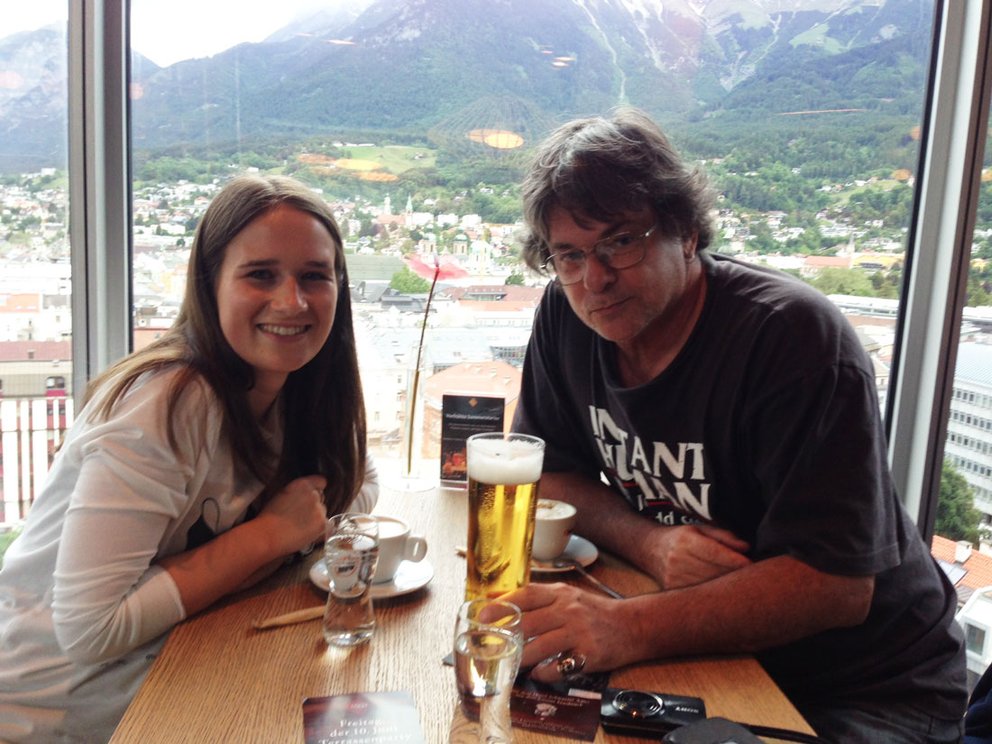
Usted ha participado en el festival de películas IFFI con dos cortos llamados “Arte“ y “Épica“. ¿Por qué decidió participar en este festival?
He participado muchas veces en este festival. Vine la primera vez en 1993. Era el segundo festival y he venido muchas veces después. Aquí tengo un festival que me gusta y que está centrado en el cine del tercer mundo, de Asia, África y América Latina. No como otros festivales de Venecia o Cannes, que son muy buenos pero que tratan otro tipo de cine.
¿Por qué cree usted que sus cortos tienen mucha actualidad o por qué le parece importante que la gente vea sus cortos?
Yo trato de que mis cortos sean sobre la realidad cubana actual, pero que sean divertidos también, que no sean solo para sufrir y para sentirse mal. Me gusta que la gente se ría del absurdo y de las cosas divertidas que tiene la realidad cubana. Me parece que es importante que la gente vea algo con lo que aprenda, pero también que se divierta. No quiero que sea siempre la mirada triste sobre Cuba porque en Cuba también la gente se divierte. Hay otras maneras de mirar a la realidad cubana y yo trato de que la mía será una de esas.
¿Tiene usted alguna escena favorita en su corto “Arte“?
Sí, la escena del desnudo porque no es una escena erótica. En ese momento es una cosa policial aunque los chicos y la chica están desnudos. Y eso de cambiarle el sentido a una escena es interesante porque es una combinación de algo triste y divertido.
En su página web ha escrito un post sobre las leyes de Murphy y el dicho que más me gusta es: “Si un experimento funciona, es que algo ha salido mal.“ ¿Hay escenas en sus cortos que, desde su punto de vista, crea que no han salido muy bien? ¿Cambiaría alguna de ellas?
Sí, claro. Cuando el espectador ve una película sigue sobre todo la historia. Pero el realizador ha visto muchas veces sus películas y por eso ve un error de sonido por acá o una cosa en el fondo que no debía estar o un momento en que el actor corta un poquito más. Supongo que eso les pasa a todos los directores. Pero son siempre pequeñas cosas y en general tengo que decir que estoy bastante satisfecho con mi trabajo, aunque hay algunas cosas que cambiaría.
¿Qué desafíos tuvo durante la realización de sus cortos?
Son películas independientes. Entonces el primer desafío era que teníamos muy poco dinero y tanto los actores principales como la tecnología son de muy buena calidad. Entonces, ¿cómo conseguir buenos actores, los mejores de Cuba, cámaras que filman y los mejores músicos con poco dinero? Casi todos son amigos míos y hemos podido llegar a un acuerdo siempre. Mis películas cuentan una historia crítica y por eso es muy importante estar seguro de cada palabra que se va a decir. No porque tengas miedo sino por el miedo de equivocarte, de que un diálogo no sea tan gracioso o no quede tan claro.
Su película “Épica“ trata del futuro y del pasado. Que piensa usted, ¿cómo será el cine en el futuro? ¿Habrá cines? ¿Y cómo serán?
Espero que sí. Yo quisiera pensar que el cine va a sobrevivir pero por otro lado es difícil porque prácticamente ya se pueden hacer actores digitales que no tienes que pagar. Pero me imagino que este sentido de contar historias visualmente con una combinación de sonido e imagen seguirá en el futuro. No sé si se llamará “cine“ u otra cosa. El cine evolucionará.
¿Cree usted que tenemos que tener miedo del futuro como el hombre en su corto “Épica“?
Sí y no. Hay que tener miedo porque cada vez hay menos ilusión, cada vez se mueren más animales. Todo eso es cierto, pero tampoco podemos vivir angustiados. Tenemos que tratar de hacer algo para tener un futuro mejor.
¿Se identifica con algún personaje de sus dos cortos?
Yo diría que con Nicanor, el personaje principal de “Epica“. La definición es que él es el cubano normal, el cubano que no es un héroe y que tiene preocupaciones en cuanto a sobrevivir y encontrar su lugar. En ese sentido todos somos un poco Nicanor y yo en particular me identifico con él. Nicanor reacciona como puede porque no es un héroe y por eso me identifico bastante con él.
En su página web ha escrito que “para el cubano de a pie, el artista es desde luego un tipo con suerte. Se levanta a la hora que le da la gana, se pasa el día, aparentemente, sin hacer nada“.¿Pero cómo es el día en realidad para un director como usted?
Eso es lo que la gente ve. En realidad puedes estar en tu casa o en tu cama pensando y creando. Pero la gente piensa que pasas el día durmiendo, viendo películas y que eso es la buena vida. Pero la vida tampoco es tan glamurosa. Aunque hay partes del año en que no puedo filmar, pero yo siempre trato de hacer algo. Escribo también narrativas o para periódicos. En condiciones ideales siempre estarías preparando tu próximo proyecto, aunque pueda ser en la cama y viendo una película.
¿En qué proyecto está trabajando usted ahora o cuáles son los proyectos que quiere realizar este año?
Ahora mismo estoy terminando un documental sobre el concierto de Rolling Stones en la Habana en marzo. Un documental que no es una película del concierto sino cómo lo vemos nosotros desde el público. Tarda unos cuarenta minutos. Y tengo un par de proyectos de largometraje pero ahora son solo guiones no terminados. El resto del año terminaré el documental y trataré de mover estos proyectos a ver si consigo un espónsor.
Muchas gracias por la entrevista. Espero que veamos más de sus proyectos.
Interview conducted by Pauline Unterleitner
Interview mit Eduardo del Llano als PDF-Datei
Julia Gutweniger und Florian Kofler
→ Regisseure aus Südtirol. Dokumentarfilm Brennero/Brenner
BRENNERO/BRENNER – (k)ein Grenzort?
Im Rahmen des Internationalen Filmfestivals in Innsbruck wurde am Sonntag den 29.05.2016 „BRENNERO/BRENNER“ (2016), der 67 minütige Dokumentarfilm von Julia Gutweniger und Florian Kofler gezeigt. Der Film handelt vom italienisch-österreichischen Grenzort Brenner, der vor allem in letzter Zeit durch Ereignisse wie der Flüchtlingskrise und der Transitverkehr-Problematik Aufmerksamkeit erlangte.
Die beiden in Südtirol geborenen Regisseure kennen sich seit ihrer Studienzeit an der Kunstuniversität Linz, wo sie bereits erste gemeinsame Projekte realisiert haben. Daraus hat sich später eine Kooperation unter dem Namen „Villa Mondeo“ entwickelt und gemeinsame Filme wie „AUGUST/SEPTEMBER“ (2011), „FI JOHR FI JOHR“ (2011), und „PFITSCHER“(2013) sind entstanden. Zu ihrem aktuellen Werk „BRENNERO/BRENNER“ haben sich die beiden RegisseurInnen Zeit genommen, um unsere Fragen ausführlich zu beantworten.
Julia Gutweniger, Florian Kofler, wie war für euch die Präsentation eures Filmes BRENNERO/BRENNER beim IFFI?
Es war toll, dass wir die Gelegenheit hatten, unseren Film im Rahmen des IFFI einem Innsbrucker Publikum zu zeigen, für welches der Brenner kein unbekannter Ort ist. Auch waren die Reaktionen und Gespräche nach dem Screening sehr interessant und spannend.
Wie ist die Idee entstanden, einen Dokumentarfilm über den Ort Brenner zu drehen?
Wie viele andere in Österreich Studierende kannten auch wir den Brenner hauptsächlich als Ort des gehetzten Umsteigens von einem Zug in den nächsten. Abgesehen vom Bahnhof war uns die restliche Umgebung also nicht sonderlich vertraut. Die änderte sich für uns im Herbst 2013, als wir im Rahmen des Kunstfestivals Transart am Sattelberg oberhalb vom Brennerpass unterwegs waren: entlang des Grenzkamms ziehen sich dort die heute verlassenen, aus der faschistischen Ära stammenden Bunkeranlagen Mussolinis und markieren eindrucksvoll den Verlauf der Grenze zwischen Österreich und Italien. Dieses plötzliche Sichtbarwerden der Grenzlinie hat uns fasziniert und unsere Interesse für den Ort Brenner geweckt. Dies war der Ausgangspunkt für die Arbeit an unserem Film.
BRENNERO/BRENNER ist euer erster Langfilm: Wie war für euch die Arbeit im Vergleich zu eurem Kurzspielfilm PFITSCHER? Auch im Vergleich von Spielfilm – zum Dokumentarfilm?
Im Dokumentarfilm muss vieles schnell gehen. Viele für den Film spannende Momente passieren unangekündigt und dauern oft nur kurz. Kaum ist die Kamera aufgebaut, sind sie schon wieder vorbei. Gleichzeitig spielt das Warten eine große Rolle. Wir hatten Drehtage, die wir nur mit Warten verbracht haben, ohne dass wir irgendetwas filmen konnten. Die Kamera übt dabei immer Einfluss auf die Umgebung aus und verändert Situationen. Menschen reden, bewegen sich und sind einfach anders, wenn sie von einer Kamera beobachtet werden und da wir für uns beschlossen hatten so wenig wie möglich inszenierend einzugreifen, mussten wir eben geduldig sein. Glück spielt beim Dokumentarfilm eine wichtige Rolle.
Im Vergleich dazu lassen sich beim Spielfilm Situationen künstlich herstellen und sind im Idealfall beliebig wiederholbar. Oft können diese artifiziellen Szenen mit den dokumentarischen Momenten nicht schritthalten und so liegt das Ideal für uns wohl irgendwo dazwischen.
Wie viele Leute haben hinter der Kamera vor Ort mitgewirkt?
Wir waren immer zu zweit unterwegs - Julia hinter der Kamera und Florian als Tonmann.
Wie kann man sich die Technik hinter so einem Film vorstellen? (Licht? Kameras? Stative? ...)
Technisch sind wir sehr reduziert vorgegangen. Wir benutzen eine sehr kleine Kamera, ein Fotostativ und das auffälligste an uns als Filmteam war meist der buschige Fell-Windschutz unseres Mikrofons. Die ProtagonistInnen wurden meist mit kleinen Funkmikros ausgestattet und bezüglich der Beleuchtung haben wir ausschließlich mit dem Vorhandenen Licht gearbeitet, es gab also keine zusätzlichen Scheinwerfer. Dadurch konnten wir vor Ort sehr flexibel arbeiten.
Ihr dokumentiert mit BRENNERO/BRENNER ein ganzes Jahr der Vorgänge in der Ortschaft: Wie lange hat der eigentliche Dreh am Brenner gedauert? Wie oft habt ihr z.B. innerhalb eines Monats gedreht? Wann habt ihr mit den Dreharbeiten begonnen?
Effektiver Zeitraum der Dreharbeiten war von September 2014 bis Oktober 2015. Wir haben also etwas mehr als ein Jahr am Brenner gedreht, wobei wir im Monat meisten ungefähr eine Woche vor Ort waren. Schlussendlich ergab sich daraus Filmmaterial in der Länge von ca. 80 Stunden.
Hattet ihr schon vor Drehbeginn klare Vorstellungen von dem, was ihr wie drehen wollt?
Ja, wir hatten in der Konzeptphase des Films eine recht genaue Vorstellung. Vieles hat sich im Laufe der Dreharbeiten aber dann verändert. Auch unsere Perspektive hat sich immer wieder verändert und dementsprechend haben wir unser Projekt auch immer aktualisiert und neu ausgerichtet.
Wie wurde eure Anwesenheit mit Kamera und Ausstattung im Ort aufgenommen? Gab es Leute, denen es nicht passte, dass ihr filmt?
Die Reaktionen der BewohnerInnen auf unsere Präsenz im Ort war sehr unterschiedlich. Viele haben sehr ablehnend oder feindselig reagiert - was sicherlich damit zusammen hängt, dass sie von der ständigen medialen Berichterstattung erschöpft sind, aber einige haben uns auch mit Neugier und großer Hilfsbereitschaft über die rund zweieinhalb Jahre des Projekts begleitet: im Laufe der Dreharbeiten haben wir viele tolle Persönlichkeiten kennen gelernt - es sind Freundschaften entstanden, die auch jetzt, nach Abschluss des Films, Bestand haben.
Es gibt manche Szenen, in denen ihr die Leute bei ihrer Arbeit bzw. in ihrem Alltag filmt: Wie haben die Leute reagiert, als sie erfahren haben, dass ihr ihr alltägliches Leben filmen möchtet?
Die Tatsache, dass wir im Film keine Interviews vorgesehen haben, hat vielerorts, besonders im privaten Bereich, Unsicherheit ausgelöst. Wir können das gut nachvollziehen: da sitzen zwei mit Kamera und Mikro bei mir Wohnzimmer und wollen mich filmen. Erst musste sich ein gegenseitiges Vertrauen entwickeln. Einfacher war es hingegen bei Menschen, die wir bei der Arbeit begleiten durften. Dort gab es auch ohne uns etwas zu tun und so waren wir mit der Kamera oft bald vergessen.
Die statischen Bilder, die oftmals wie wohl komponierte Fotografien wirken, vermitteln dem Zuschauer eine Art der Zeitlosigkeit. Wie habt ihr das Verrinnen der Zeit am Brenner wahrgenommen?
Der Brenner ist ein Ort, an dem Zeit extrem langsam verrinnen kann. Oft gab es auch Momente an denen die Zeit vollkommen abwesend schien. Wenn wir beispielsweise nachts im Winter unterwegs waren, sich ein dichter Nebel auf das Dorf gelegt hatte und nur noch die entfernten Bahnhofsdurchsagen zu hören waren, dann schien es als seien wir in ein Zeitloch geraten.
Gab es während dem Dreh einprägsame Erlebnisse? Welche?
Vieles, was wir während des Drehs erlebt haben, war einprägsam. Vor allem die Zeit, die wir mit Volontarius verbringen konnten und die (Lebens-)Geschichten, auf die wir dort getroffen sind, waren sehr eindringlich und intensiv. Die für uns lange Zeitspanne der Dreharbeiten und den Einsatz, der damit zusammenhing, hatten zur Folge, dass das ganze wie eine Parallelwelt wurde, eine Art Second Life am Brenner.
Seid ihr während dem Dreh in eine brenzlige Situation geraten?
Besonders brenzlig wurde es glücklicherweise nie. Wenn Dreharbeiten abgebrochen werden mussten, weil beispielsweise die Polizei unsere Drehgenehmigung sehen wollte, ergaben sich öfters angespannte Situationen, die sich jedoch schnell wieder auflösten. Und einmal sind wir beim Abstieg von der Valsunspitze östlich vom Brenner, von der aus wir das Dorf von oben gefilmt haben, in die Dunkelheit geraten und mussten mit zwei miesen Taschenlampen durch den Schnee zurück ins Tal. Das war recht abenteuerlich.
Gab es Momente, in denen ihr an eurem Projekt BRENNERO/BRENNER gezweifelt habt?
Diese Momente gab und gibt es für uns immer wieder. Das gehört irgendwie zu unserer Art zu arbeiten und diese Momente waren auch der Motor um das Projekt immer wieder neu auszurichten und zu hinterfragen.
Gab es administrative Probleme vor und beim Dreh? (Polizei, Behörden…)
Wir haben bereits im Vorfeld um sehr viele Drehgenehmigungen bei den verschiedenen Institutionen angesucht und sind dabei auch meistens auf Kooperationsbereitschaft gestoßen. Beim Dreh selbst wurden wir sehr oft aufgefordert, diese vorzuweisen. Die abgesprochenen und geplanten Termine bei Institutionen sind dafür aber dann meist recht einfach. Passanten reagierten auf unsere Kamera oft sehr skeptisch, auch wenn man gar nicht sie, sondern nur die Straße oder im öffentlichen Raum filmte. Dort wurde oft Übles vermutet und unterstellt.
Wie wurde der Film finanziert?
Der Film konnte mit der freundlichen Unterstützung des Bundeskanzleramtes von Österreich, des Amtes für deutsche Kultur der Provinz Bozen, des Fördervereins der Kunstuniversität Linz und der ÖH der Kunstuniversität Linz realisiert werden.
Wie seid ihr zum IFFI gekommen?
Wir kennen das IFFI schon länger - wie bei Filmfestivals üblich, haben wir den Film dort eingereicht und uns sehr gefreut, dass er angenommen wurde.
Euer Film wurde schon auf dem Crossing Europe Filmfestival gezeigt, jetzt beim IFFI: Wird euer Film in naher Zukunft auch auf weiteren Festivals präsentiert werden?
In Kürze werden wir unseren Film beim FSFF (Fünf Seen Filmfestival) in der Nähe von München spielen können und wir sind laufend dabei, ihn für weitere Filmfestivals einzureichen.
Wurde der Film schon in Italien gezeigt - bzw. ist eine Ausstrahlung geplant?
Wie bereits erwähnt reichen wir unseren Film derzeit bei verschiedensten Festivals ein und wir hoffen selbstverständlich auf Zusagen.
Wollt ihr eine bestimmte Botschaft mit den gezeigten Bildern vermitteln?
Die statischen Aufnahmen entsprechen dem analytischen Charakter unserer Herangehensweise und unseres Blicks auf den Grenzort. So wie Menschen in dem von Prozessen und Abläufen bestimmten Funktionsort eine scheinbar unwichtige Rolle spielen, wollten auch wir als FilmemacherInnen unsere Präsenz im Film so weit wie möglich reduzieren und verwenden deshalb fast ausschließlich statische Einstellungen. Was die Langsamkeit des Films betrifft haben wir uns gefühlsmäßig an den Rhythmus des Ortes angepasst und haben uns in gewisser Weise auf das Unspektakuläre konzentriert, das in seiner scheinbaren Nebensächlichkeit oft viel weitreichendere Konsequenzen in sich birgt, als die lauten Meldungen der Schlagzeilen.
Gab es schon Kontroversen über euren Film?
Der Film ist noch sehr jung, wurde erst vor kurzem veröffentlicht und es gibt keine uns bekannten Kontroversen um den Film. Der Ort Brenner jedoch wird in der Öffentlichkeit bekannterweise sehr kontroversiell verhandelt, was auch einen gewissen Einfluss auf die Rezeption des Films hat.
Welche sind eurer Meinung nach die zentralen Themen, die den Ort Brenner (und somit auch euren Film) ausmachen?
Zentrale Themen, die wir mit dem Ort Brenner und unserem Film verbinden sind: Grenze - Flucht - Europa - Verkehr - Wirtschaft - Peripherie - Freiheit - Systeme
Ihr habt bei eurem Dreh einiges über den Ort erfahren: Was haltet ihr von der jetzigen Entwicklung mit Protestaktionen und der wahrscheinlichen Erbauung des Grenzzaunes? Wie nehmen die BewohnerInnen diese „neuen“ Unruhen auf? Leiden die Ortschaft und die Leute darunter?
Die Verschiebung des Diskurses auf nationale Lösungsansätze und den Mangel an Solidarität beobachten wir mit Sorge. Die Reaktionen der BewohnerInnen sind uns nur teilweise bekannt, einige machen sich Sorgen um ihr Dorf, andere nehmen aktiv an den Demonstrationen teil. Die Wirtschaftstreibenden am Brenner beschreiben die Demonstrationen und das meist friedliche Engagement von Menschen als Faktor für Umsatzeinbußen.
Wie hat sich durch eure filmische Auseinandersetzung mit dem Brenner eure Sicht auf diesen verändert?
Wir kennen jetzt sehr viele Facetten des Ortes, wissen also mehr über den Brenner als vor unserer filmischen Auseinandersetzung mit ihm. Jedoch ist uns dieser Ort nach wie vor nicht greifbar geworden. Die Komplexität und die sich oft widersprechenden Ebenen lassen ein einfaches Fazit oder Urteil nicht zu. Wir verbinden den Ort nun jedoch sehr stark mit einer Stimmung, die wir dort wahrgenommen haben, und die, wie wir finden, auch im Film zu spüren ist.
Arbeitet ihr zurzeit an einem neuen gemeinsamen Projekt?
Ja, aktuell arbeiten wir an der Entwicklung eines neuen Kurzspielfilms mit dessen Dreharbeiten wir im nächsten Jahr beginnen wollen.
Interview conducted by Kathrin Lusser und Veronica Rungger
Interview mit Jula Gutweniger und Florian Kofler als PDF-Datei
Manuela Buono
→ Filmvertrieb; Italien
“Un tuffo nel mondo della distribuzione cinematografica”
La distributrice italiana Manuela Buono ha partecipato come membro della giuria all’International Film Festival Innsbruck (IFFI). Lei è riuscita a darci un’idea generale di come funziona la distribuzione di un film.
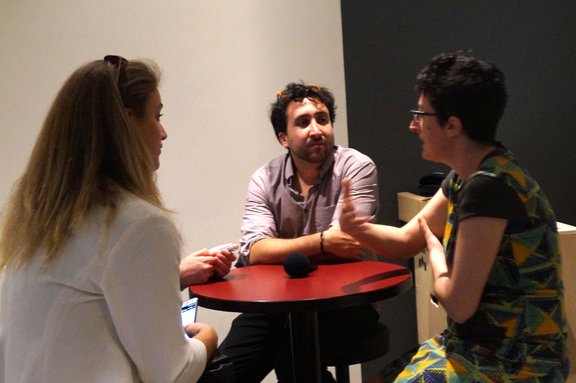

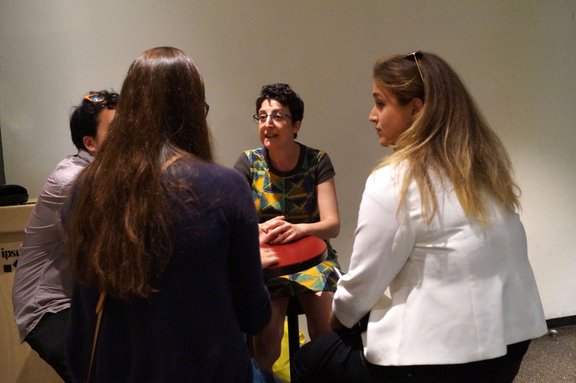
Qual è la sua professione attuale e come ci è giunta?
“Praticamente io mi occupo di distribuzione internazionale. Acquisto il film prima che siano pronti e lavora alla campagna marketing e promozione del film e poi curo le vendite internazionali, quindi vendo il film ai clienti in tutti i paesi del mondo escluso il paese del produttore. Vendo i film a festival, cinema, televisioni, distributori internazionali, piattaforme Educational e online, dvd e internet, quindi generare introiti per il film. Ci sono arrivata dopo aver lavorato per anni a molti festival, aiutando facendo esperienze come assistente o lavorando nel programma nella redazione del catalogo. Poi ho cominciato a lavorare nella produzione facendo l’assistente. Poi ho avuto un’esperienza sul set molto grande ed è stata molto importante, perché ho capito che non faceva per me anche se normalmente è la cosa più affascinante per chi desidera fare cinema. Ho capito che è un lavoro veramente duro molto fisico e gerarchico. Poi oltre lo studio all’università ho fatto un corso in Spagna che si chiama “Mega Plus” alla Media Business School a Ronda, in Andalucía, e ho scoperto che sistema la Sensagent, prima non lo sapevo e non mi ero mai chiesta che fine facessero i film una volta fatti. Ho scoperto questa figura che va in giro per il mondo nei mercati a raccontare, a promuovere e infine vendere il film. Mi è piaciuto molto, mi è sembrata una cosa molto adatta a me e ho incominciato a lavorare per altre ditte. Tre anni fa ho deciso di aprire la mia ditta, la “Slingshot Film”, con la sede a Trieste e adesso sta crescendo e sono contenta della scelta fatta.”
Tra tutti i film che ha distribuito, ce ne è stato uno che Le è rimasto impresso in particolar modo?
“È la domanda che si fa ai bambini davanti ai genitori “preferisci mamma o papà” e il bambino sa che ha una preferenza ma non la può dire. In realtà io mi sono divertita molto con tutti i film, sono tutti molto diversi e quindi ogni film è stata un’esperienza diversa. Poi noi iniziamo a lavorare su un film prima che sia pronto, dobbiamo incominciare a pensare dove fare la prima festivaliera e come far sì che il film non passi inosservato. Poi lavoriamo molto a stretto contatto con i registi, che a me piace molto, perché riesco a capire quali sono le sue aspettative, i suoi progetti futuri e quindi cerchiamo di far incontrare il nostro percorso con quelli che sono i suoi desideri. E quindi ogni film prende un percorso completamente diverso nel modo di essere venduto, promosso, raccontato completamente diverso e per me è ogni volta un bel viaggio. Adesso per esempio due film che sono anche un po’ più vicini a voi, uno è stato presentato all’IFFI due anni fa, ovvero il film di apertura (Zoran, il mio nipote scemo), ed era una commedia alcolica girata al confine fra il Friuli Venezia Giulia e la Slovenia ed era un’opera prima. Quel film l’abbiamo promosso in molti modi ma soprattutto esportando l’energia e le atmosfere in cui il film è ambientato. Quindi anche qua a Innsbruck avevamo ricostruito una piccola taverna dove si vendono vino, uova sode e abbiamo ricostruito anche un giardino e abbiamo festeggiato immaginando di essere dei personaggi del film.
Invece un film più recente su cui sto lavorando è un doku-thriller di produzione austriaca che si intitola “A Good American” (2015), un film politico molto forte. Ci porta a frequentare altri tipi di canale e incontrare altri tipi di persone che hanno la possibilità anche di far conoscere bene il tema al pubblico a livello politico, istituzionale e giornalistico.”
Quanti film ha distribuito fino ad oggi?
“Con la mia ditta abbiamo distribuito dal 2013 per scelta una decina di film che sono molto pochi, perché mi piace concentrarmi su ogni film con molta attenzione in modo da avere un inventario più personale. Mi piace molto accompagnare personalmente il film al festival ed essere presente all’anteprima che richiede molto sforzo. Non ho intenzione di allargare innecessariamente il catalogo.”
Quanto tempo richiede la distribuzione di un film?
“La distribuzione avviene una volta girato il film ma poco prima che la postproduzione sia conclusa, in modo che riusciamo a collaborare con la realizzazione dei materiali che serviranno per vendere il film come ad esempio il trailer, i poster, la scelta delle fotografie, la frase di lancio, ecc. Nei primi mesi ci occupiamo della promozione cercando di ottenere interviste e visibilità. Successivamente ci dedichiamo alle vendite territorio per territorio promovendo i film ai festival preferibilmente più piccoli per riuscire ad ottenere maggiore attenzione da parte degli acquirenti.”
Interview conducted by Pauline Giacomuzzi, Javier Correa, Ginevra M. Melega
Interview mit Manuela Buono als PDF-Datei
Mohammed Soudani
→ Regisseur aus Algerien. Ehrenpreisträger. Filme: Taxiphone, Guerre Sans Images, Waalo Fendo
"Moi, je suis un fou"
Mohammed Soudani est un réalisateur de film et directeur de la photographie. Né en Algérie, il vient en Europe après sa scolarité où il s’établit comme cinéaste. Depuis 1972, il vit en Suisse avec sa famille. En tant que lauréat du prix d’honneur de l’IFFI, il a pris le temps de répondre à nos questions.
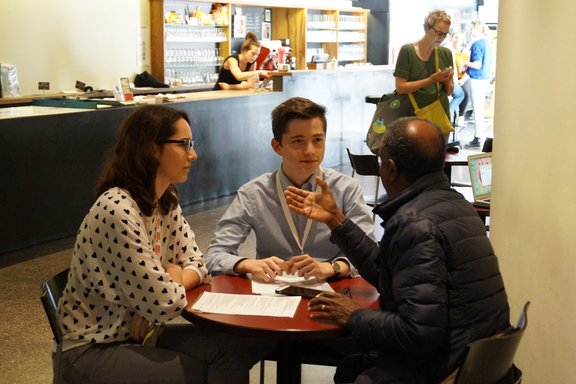
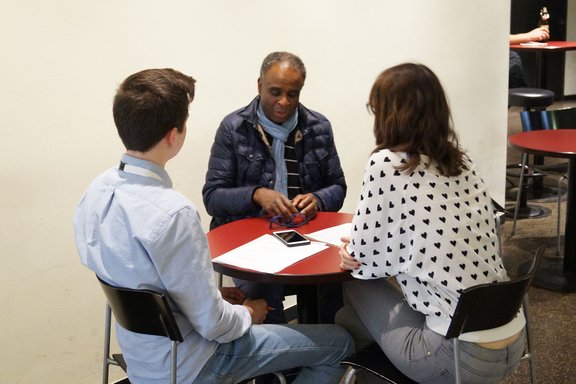
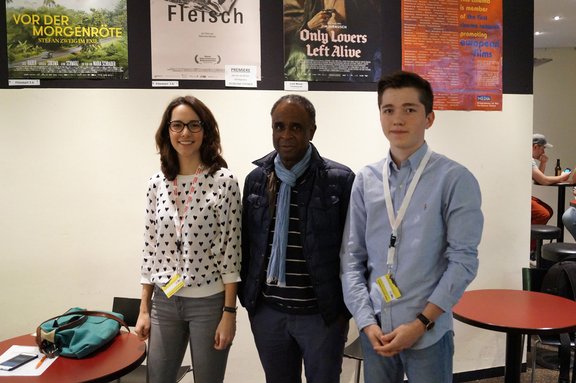
Bonjour M. Soudani, tout d’abord nous vous félicitons pour le prix d’honneur. Comme vous avez déjà assisté au festival international de film d’Innsbruck plusieurs fois, est-ce que vous avez des liens particuliers à l’IFFI?
M. Soudani : Je n’ai pas de lien particulier, mais j’aime beaucoup ce petit festival qui est très important. Quand je dis petit, ça ne veut pas dire que ce n’est pas un bon festival. Le mot petit veut dire qu’il fait des sélections spéciales. Il montre des films qu’on ne peut pas voir ailleurs. C’est un festival qui ouvre les fenêtres au monde. Selon moi, c’est un festival qui vivra beaucoup plus longtemps parce qu’on est fatigué des films américains et tous ça. Ici, j’ai vu et j’ai découvert des films indiens, afghans et d’autres nationalités, que je n’ai jamais vus ailleurs. C’est pour cela que j’ai un grand respect pour ce festival.
Est-ce que vous assistez aussi à d’autres festivals de film?
M. Soudani : Oui, c’est clair que j’étais invité par différents festivals avec mes films, mais je visite des festivals, même quand je ne suis pas invité. En février, par exemple, j’étais à Berlin. Ma femme, Tiziana est productrice, produit mes films et aussi des films d’autres réalisateurs. Elle était à Cannes et à Venise pour rencontrer d’autres producteurs et réalisateurs qu’elle connaît. On est dans le monde cinématographique et on a notre propre maison de production Amka film. On voyage et on va voir des festivals parce que c’est important aussi d’apprendre et de voir qu’est ce qui se passe sur le marché mondial.
Alors, comme on sait, vous êtes de l’origine algérienne, mais quelles étaient les raisons pour la décision d’aller en Europe?
M. Soudani : J’ai quitté l’Algérie parce que j’avais envie de continuer ma formation de cameraman. Avant de venir en Suisse, j’étais un jeune cameraman et je jouais aussi au football. Je suis venu en Suisse grâce au football qui n’a jamais été une priorité pour moi, mais c’était un alibi. Ma formation a été en Algérie et en France, à Paris. Quand je suis arrivé en Suisse, j’ai joué trois ans puis, à la quatrième année j’ai refusé de signer un nouveau contrat avec l’équipe où je jouais, j’ai remboursé de l’argent et j’ai trouvé du travail dans une société de production cinématographique et plus tard je suis allé aux Etats-Unis pour suivre une formation de directeur de la photographie.
Vous avez expliqué que vous êtes allé à Paris afin d’y faire des études, pourquoi exactement à Paris?
M. Soudani : L’Algérie était toujours liée à la France, même s’il y avait la guerre d’indépendance, à cause de la langue. En plus, ce n’était pas moi qui ai décidé, c’était la télévision. C’était l’état algérien qui a payé mon stage. Et donc, on a fait une formation qui était en Algérie, mais lié aussi à la France. J’ai fait plus d’école à Alger qu’à Paris. À Paris c’étaient seulement des spécialisations.
Quels sont les premiers succès que vous avez faits avec vos films ?
M. Soudani : Je n’ai jamais pensé au succès. Quand j’ai commencé à faire des films, j’ai fait des documentaires en Afrique. Les premiers documentaires que j’ai tournés ont eu de la chance. Yiribakro, par exemple, a été considéré après sa publication en 1991 comme un des douze meilleurs documentaires européens au MIP tv de Cannes. En 1998, le film Waalo Fendo - daté de 1997 - était également une surprise parce qu’il a gagné le prix du meilleur film suisse. Moi, je suis quelqu’un de très simple. Je fais des choses qui m’intéressent et c’est peut-être le secret du succès. C’était la première année où est né le Prix du Cinéma Suisse et c’est un Africain qui l’a gagné. On était tous heureux.
Avant de parler de vos productions en détail, nous aimerions bien savoir d’où vous prenez vos inspirations.
M. Soudani : Si vous posez cette question à ma femme, vous aurez la plus belle réponse du monde : Moi, je suis un fou. Ça veut dire que je ne suis pas normal, mais les fous sont des gens qui ne sont pas aussi fous qu’on pense. Toutes mes inspirations arrivent de la réalité et de la nature. Les choses que je rencontre et que je vois m’inspirent.
Venons maintenant aux films présentés à l’IFFI : Nous venons de voir Guerre sans images1 (2002). Quelle est l’histoire derrière ce film ?
M. Soudani : J’ai rencontré mon partenaire Michael, un photographe suisse, dans un workshop au Côte d’Ivoire. C’est lui qui m’a montré l’album de photo qu’il avait pris en Algérie quelques années avant. Les photos m’ont parlé et quelques mois plus tard je l’ai appelé et je lui ai fait une proposition : On choisit six photos de personnes vivantes de l’album et on va les chercher en Algérie 10 ans après. Je voulais retrouver ces Algériens et leur donner la parole.
D’après vous, ce film est-il encore actuel aujourd’hui étant donné qu’il y a déjà 14 ans depuis le tournage ?
M. Soudani : Moi, je dis oui. Il faut juste regarder ce qui se passe en Syrie. Le film Guerre Sans Images est encore actuel, parce que c’est encore l’histoire de ces personnes du monde arabe qui se tuent entre eux. C’est un film qui te fait à réfléchir.
Travaillez-vous actuellement sur des nouveaux projets?
M. Soudani : C’est ça, la question que j’attendais. Alors, en ce moment, j’ai deux projets qui sont imminents et j’ai un troisième daté de 2004 que – si Dieu le veut – sera fini vers la fin de 2017. Un des projets que je veux faire c’est un documentaire spécial en Afrique. Je veux donner la parole aux femmes. Je ne suis pas le premier qui fait ça, mais les femmes auxquelles je vais parler sont différentes des femmes qu’on a déjà interviewées. Je veux parler aux femmes qui sont aux pouvoirs, par exemple la présidente de la république libérienne et aux femmes qui travaillent pour l’état. Ce sont des femmes qui sont au mouvement. Il y a aussi un autre projet pour lequel on attend le financement. Je ne peux pas en parler beaucoup, mais c’est un film sans dialogue. Dans le monde dans lequel on vit, on a trop parlé.
Notre dernière question: Quelle importance attachez-vous aux festivals du film en general?
M. Soudani : Les festivals sont une chose très importante parce qu’ils donnent la possibilité de montrer ce qu’on a fait et souvent quelqu’un vous appelle après avoir vu un de tes films dans un festival. Les festivals donnent de la visibilité aux films. Je ne parle pas uniquement des prix, mais c’est important d’être invité parce que ça veut dire que ton film vaut quelque chose. En plus, dans les festivals on voit des films qu’on ne peut pas voir ailleurs.
Merci d’avoir pris le temps de nous recevoir et bonne chance pour la suite de vos travaux !
1 Guerre sans Images – Algérie, je sais que tu sais est un documentaire sur les circonstances de vie dans la patrie de M. Soudani. Ensemble avec son collègue et photographe suisse Michael von Graffenried, ils ont recherché des Algériens pour savoir ce qu'il était advenu d'eux, ce qu'ils pensaient de leur passé et pour les faire réagir à des photos de Michael von Graffenried.
Lien: https://www.youtube.com/watch?v=4Vhu0BJ1T7s
Interview conducted by Hannah Loacker und Philipp Reicht
Interview mit Mohammed Soudani als PDF-Datei
Yared Zeleke
→ Regisseur aus Äthiopien. Film: Lamb
From the Ethiopian Plateau to Europe’s Film Festivals
Yared Zeleke is an Ethiopian film director whose film Lamb won the International Film Festival Innsbruck 2016. He studied Writing and Directing at New York University and later moved to San Francisco, where he lives now. His film Lamb shows the story of an Ethiopian boy named Ephraim who has to move in with his uncle and his family. He is confronted with traditional attitudes and life as a farmer in Ethiopia´s rural countryside. Together with his Lamb, Ephraim tries to run away, and in this attempt to flee he makes a number of exciting experiences.
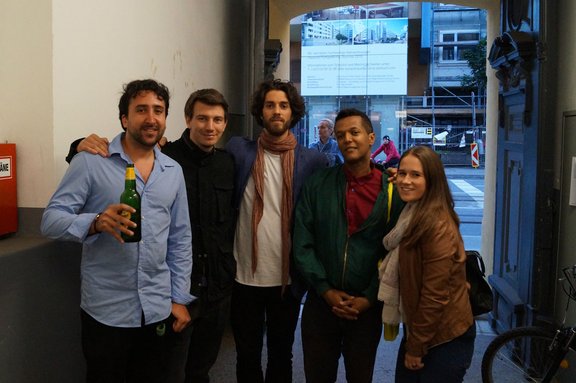
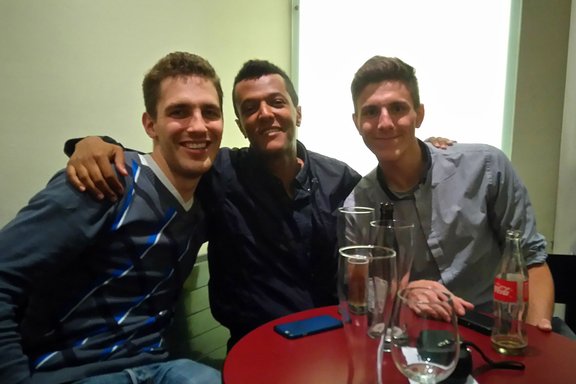
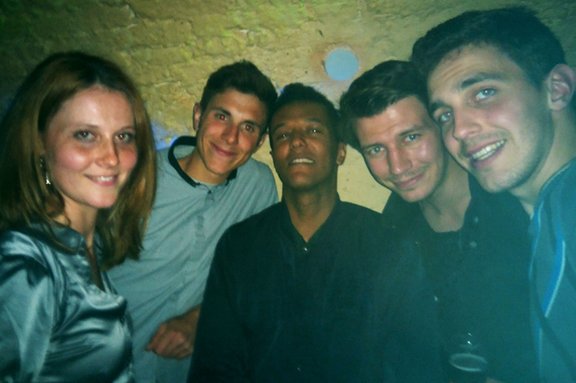
I: Do you like Innsbruck?
Yes, it is just so beautiful. I live in California and I took an over night flight and when I woke up I saw these incredible mountains through the window. I couldn´t believe my eyes because I couldn’t imagine Innsbruck to be directly surrounded by the Alps. Wherever you look, there are mountains! I immediately sent pictures to everyone via Facebook and I told everybody how beautiful this city is. This city is simply amazing!
I: Have you already been up near the mountains?
Not yet, I want to go on Sunday.
I: How long do you stay here?
I´m going to stay until Monday and then I go to Graz, Austria.
I: Is there another film festival in Graz?
I think in Graz there will be a cinema opening. But after Graz, there is a film festival in Slovenia which I am invited to. Afterwards I will go back to California.
I: At the beginning of the movie, Ephraim, who loves cooking, can´t understand why it is considered typical girls’ work. However, later he breaks with the traditions. Can you tell us more about Ephraim and these Ethiopian traditions?
In Ethiopian culture men don´t cook. So Ephraim breaks the gender roles as does the girl (Tsion). She wants to study instead of getting married and have children. For me the kids represent representing the future and my hope for Ethiopia to become a more educated and liberated country. This is something that is really happening.
I: The title of the film marks the important role of lambs in Ethiopia . Can you tell us more about the role of the lamb in the movie and why you chose this particular symbol?
There always were five lambs on set. Those were northern Ethiopian lambs, which are generally red. I am happy to say that we just filmed with one lamb because she was the smartest. She was the best choice. I wanted to do a story with a lamb because in Christian religion the lamb is a symbolic creature and represents innocence and this story is very much about innocence - from childhood to adulthood. I also found out that there has never been a film starring a real lamb. Of course there are movies with horses, whales and so on, but not a single one with lambs. Maybe this is the case because lambs are not smart, but I found a smart one.
I: Do you plan another film?
Lamb is about childhood. It is like a fable of Africa, but my next film is about youth. It will be about the frustrated Ethiopian youth and is going to be set in the city. The movie is going to have rock music, it`s going to have techno music, and you will see a side of Ethiopia which no one has ever seen. It will be just like city life. There is the rich part of the city, with all the tall buildings, but you´ll also see the contrast between the rich and the poor kids, because this is how it is. Lamb was very slow and thoughtful. The next film is going to be chaotic and crazy, like a teenage portrait should be. It will cover topics like the first love, fights and road trips. The youth group is going to the rift valley of Ethiopia, which is a very different landscape compared to what you saw in Lamb. They go on a really, really crazy adventure, which is completely different from Lamb.
I: What is your new movie called?
It`s called 1991 because all the kids in the movie were born that year. Ethiopia had a communistic military dictatorship from 1974-1991. Actually, we grew up with Eastern German films. It is crazy. So as a kid I didn’t watch Hollywood productions, but I watched Bollywood movies and Eastern German soap operas. I grew up in communism communistic environment. Then after 1991 we became a democracy, or as my uncle calls it “demo-crazy”. Ethiopia is very rich; Like most of Africa, the natural resources are very rich but the educational system is not. So a lot of kids are taking dangerous journeys across the sea to Europe, across the desert to Arabia, or across the African savanna to South Africa; and it is a shame, because they have the brain power, but they don’t have many opportunities in Ethiopia. That is the tragedy of Africa and that is what I want to show. Do you remember that girl in Lamb, Tsion? My next film will continue with her story.
I: Is she based on a real story?
No I made her up, but it´s inspired by a true story.
I: So you´ll link them together to a triple feature? Maybe?
Exactly. Actually, you said it! You gave away the secret, my dream is a trilogy.
I: Will the girl be played by the same actress?
Yes, but only the girl. The next film, I´d say, is even more pro-women. Because Ethiopian girls are really pretty, he country is famous for their beautiful women, but they are very poor, and the problem with this is that Arabia on the other side of the Red Sea is very rich. We have a growing prostitution problem. The majority of African models is from my country. They are very tall and have very beautiful faces, but they are poor very often. Moreover, we have the problem that the girls end up as domestic workers, for example as housemaids and cleaners in rich countries like the United Arabic Emirates or South Africa. Sometimes they are even sold as sex slaves against their will. In my next movie you´ll see those beautiful girls and after the movie you will know more about their lives and the circumstances.
I: We have never been to Ethiopia, but in your movie we got to see a lot of Ethiopian culture and traditions. Was it one of your intentions to show the world what Ethiopia is like? What is the living situation like there? What are the traditions? Which dances and festivals are there?
Yes, exactly. Because the image of Africa is not really good. I left Ethiopia when I was 10 years old and grew up in the USA. Many people there thinkt hat people in Ethiopia live on trees or that Ethiopia is a desert. I have never seen a desert in Ethiopia. People always think that I am from the desert, but I am not from Egypt, I am not from Arabia, I am from Ethiopia. My country is twice the size of Germany and it´s mountainous. My city is on 2500 meters; hence, conditions for filming are very hard as it´s also very cold. It´s a little bit like here in Europe. We shot at about 3000 meters. 70% of the African mountains are in Ethiopia. As you can see, Ethiopia is quite cold, mountainous and foggy, and sometimes the weather was working against us! We were in the rough part of Ethiopia, and they actually don´t have electricity there, so they don´t have television. This part is still untouched, it´s like a virgin land! The people didn´t know what we were doing. We were like aliens with strange objects making experiments with them. It was really hard to gain their trust by showing them what we are doing. The people there are very proud, especially the Christian farmers, and it took us a long time to gain their trust. When my scene photographer, a French-Canadian, came to Ethiopia she said: “This is like Austria!”,and I answered that I have never been to Austria, but now I understand what she meant. There are not many African movies and not many African movies by Africans. Africa is very big, and I only know one country, but its image is not good. In Europe you can seethe poorest of the poor arriving as immigrants from different African countries. The media shows you the wars, the really horrible things, which are just so terrible for us to see.
Lamb is not just about the Ethiopian culture, it`s actually about humanity, about how and who we are; because kids in Austria suffer too when they lose their mum or when their parents divorce. After all, we are all human beings and breathe the same air on planet earth. I wanted to show kindness, gentleness, and beauty because you don’t get to see that from Africa usually; as all you get to see is really ugly.
I: I have been to South Africa for six weeks but I think it’s very different from Ethiopia.
Cape Town is beautiful, but it is a very different culture. It’s the opposite of Ethiopia. We never had the European Colonialism, we look different, we are different, and have a different history. Seeing South Africa was shocking for me. It’s like another world. When you go to Ethiopia, you can see very proud people, no matter how poor the farmers are. It´s their land and their culture; so they know who they are, and they are very proud of being who they are. They are also very dignified. There is a great gentleness in the air and within the people. There is no violence and no hate. If you google Ethiopian crime statistics, you will see that it is one of the safest countries in the world. Even though it’s poor it is very gentle. South Africa is violent and very segregated in black and white. Everyone has a gun. That’s shocking for me. If you tell the people in Ethiopia that you are black, they won´t know what you mean. They are Ethiopians and that´s it.
I: Ethiopia is heavily affected by climate change. Did you try to show this in your movie?
Yes, I wanted to point that out. In the USA, I am sorry to compare it to the USA, but I grew up there and I lived there, climate change is a big debate, and at least half of the Americans do not believe that global warming is happening. But in Ethiopia you don’t have to be educated or watch the news on television to know this because you are living climate change every day. 85 percent of Ethiopians are farmers, so we are still an agrarian society, exactly like the people in the movie Lamb which you saw. In Ethiopia, they really live like the people in the movie. They wear traditional clothes and are very religious. They live together with earth and know that it is changing. When people see the movie they say: “Oh, Ethiopia is so green. Why are the people there ever hungry?”. The problem is that, if it rains too much and at the wrong time, your crops will die. Climate change is climate change, which doesn’t mean dryness or desert; it means that the weather is changing. In Ethiopia, it used to rain from March to August, so if it stops raining in June, for example, a lot of crops will die. When you depend on a farm, this means that you are in danger, which is our main problem. Therefore, climate change is not a debate but a reality for a place like Ethiopia.
I: Are a lot of people moving into the cities and are the cities growing faster because of this?
Yes, exactly. Most of Ethiopia is still rural, but this is happening like all around the world. So this means a big change as I wanted to show in the movie.
I: How did you choose the music?
The music in the background is Ethiopian contemporary and traditional music. There is a massive movement of farmers moving to the cities. I wanted to show that with a mix of traditional and modern music. I knew that there would be Western and Ethiopian audiences, and I wanted to connect those! For the Western ears the piano is much more familiar and people will feel more connected to the film then.
I: Did any farmers see the film and did they like it?
The American news network CNN did a show on this. They did what I don´t have the money for. They put all farmers on a bus and took them to the nearest city. There they saw the film and themselves within a film for the first time! Their comments afterwards were the best reviews I got for this film.
I: Which ethnical group was that and which language did they speak?
It was the Amhara group, which is culturally and historically dominant. I am half Amhara myself, from my mother’s side.
I: A lot of the clothes in the film are green. Why? What is the role of it?
The costumes show what people in Ethiopia really wear. Some people think that these are special costumes but don´t consider that this is what they wear every day. The green colour represents richness and reflects the land.
I: Do you like cooking?
I am from the city. I´ve never had a pet and I don´t like cooking. A large part of this film is my imagination.
I: How did you finance Lamb? Was it difficult to find resources to make the movie?
It was very difficult because of the animals and the children. In the USA, they say you should never produce a film with animals or children. It is very dangerous for investors to invest in such a film, and also the shooting in Africa, especially for this type of movie, is very expensive because there is no electricity there. You have to bring big trucks, fill them up with gas, and take them into rural areas across the mountains to this cold place. The whole investment came from Europe and I am really thankful to Europe for this.
I wrote a script and the script won the French film board. It is not very common for African scripts to win, but I was very lucky. The French film society really liked the script, and it was number one in 2012.From then on people took me and my producer serious. They took us very serious because it is a big award and, therefore, we were able to get more money. Most support came from France, Germany, Switzerland, Norway, and Qatar. Those are the countries which invested money in the movie. At the end, the budget was 1.5 million euros, which is really a big sum for a first movie anywhere in the world but especially big for Africa. I know my situation is very strange and rare, but it opens the doors for other filmmakers to make movies in Africa.
I: Are you famous in Ethiopia now? Do the people know you?
My actors are, but not me. They see them, but they don`t see me.
I: Throughout Ethiopia? Are you known there?
No, because I`m quite shy, so I don`t really get on TV shows and things like that, but my actors do. When they ask me for interviews on TV, I just say that the actors should go there. Even on this stage here my hands were shaking.
I: What do your family and friends say about your success?
They are awesome! They support me every day. Tonight, they show my movie in New York City and in San Francisco, where I actually live, and all my friends are supporting me and my movie. I am really lucky to have them.
I: How did you get into filmmaking? Did you receive training?
I have a master degree in Writing and Directing from New York University, which is a famous American film school. For example, Martin Scorsese went there. Some of my teachers were, for example, Spike Lee and Todd Solondz.
I: Has it always been your dream to become a director?
Yes, it has always been my dream, but I pushed it away for a long time. Then I did my masters.
I: Which one is your favourite scene in the movie?
Of all the questions you asked me, this is the most difficult one. Okay, to be honest, I have not seen my movie for a long time. I just introduce it and leave. It stresses me out because I am still critical. I have not seen it for, more or less, one year. I like the dancing scene in the end, so, usually, towards the end of the movie I come back into the cinema auditorium to see the dance and the crowds. I also like the prayer scene with the Muslim girl. When I wrote it, I saw exactly how I wanted it to be. I tried to catch the feeling that it’s not about being Muslim or Christian or Jewish or atheist, it’s just about the spirit, about this planet and who we are. There is a spirit in everything; I just wanted to show that. I don’t know if other people have seen it, but I can feel the spirit. For me, it’s not about the Muslims; it is about the connection to nature which we´ve lost in modern times.
I: Do you want to build bridges and break with gender traditions?
Yes, that`s right.
I: Would you change anything about the movie, in retrospect, if you could?
To be honest, I don`t know if I would change anything. I am very lucky, of course I watched it and thought I want this or I want that, but, in the end, I can`t complain about the movie. For example, I am very proud of my non-actor, actors, and everyone.
I: How long did the production of the movie take from the beginning to the end, also the time in Ethiopia?
The whole film took five years, from writing down the first idea to the Cannes Filmfestival. Now with the travelling it`s six years, but it took five years to make it until it was introduced to the world. The shoot in Ethiopia took 36 days, crazy 36 days. We visited different parts of the country. The visual and all sound was done by Germans; therefore, the sound was edited in Berlin.
I: Where did you sleep during the shoot in Ethiopia? You have been to rural places. Was it difficult to find something?
We slept in the nearest Hotel, which was one hour away from the location.
I: How many people were part of the crew?
The crew had about 50 members, mostly Ethiopians. A lot of crewmembers were French, German, Belgian, Canadian. Then the cast was about another 50, so it was about 100 of us. We basically took over the whole hotel. We were there for one month, and when we left the people there were crying because it was in the middle of nowhere they had grown close to us. They are not used to things like this. For them it was a big deal, so the staff and the manager cried. Ethiopians are very dramatic. We said: “We will visit you in the future”. The Europeans were crying too because they had never experienced such a thing and the people there had been very kind.
I: How difficult is it to get permission for filmmaking in Ethiopia?
(He answers in German): Es ist schwer, zu schwer. Die Bürokratie dort ist nicht an internationale Filmproduktionen gewöhnt. Die äthiopische Regierung kann sehr streng sein, aber am Ende haben wir die Erlaubnis bekommen. (It is really difficult, too difficult. The bureaucracy is not used to international film productions. Ethiopian government can be very strict, but, in the end, we got the permissions).
I: Why do you speak German?
(In German) –Ich habe Deutsch auf dem College in den USA gelernt, aber ich habe lange kein Deutsch mehr gesprochen. Ich habe vieles davon vergessen. (I learned it in college in the USA, but I haven´t spoken German for many years. I forgot a lot of it).
I: Thank you very much for the interview.
Thank you, dankeschön.
Interview conducted by Teresa Glarcher, Lukas Egger, Stefan Witting, Patrick Müller
Interview mit Yared Zeleke als PDF-Datei
